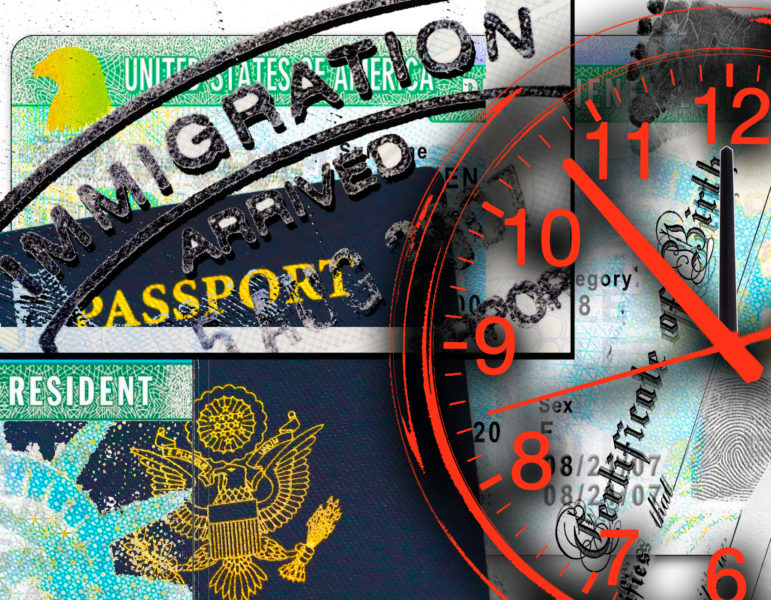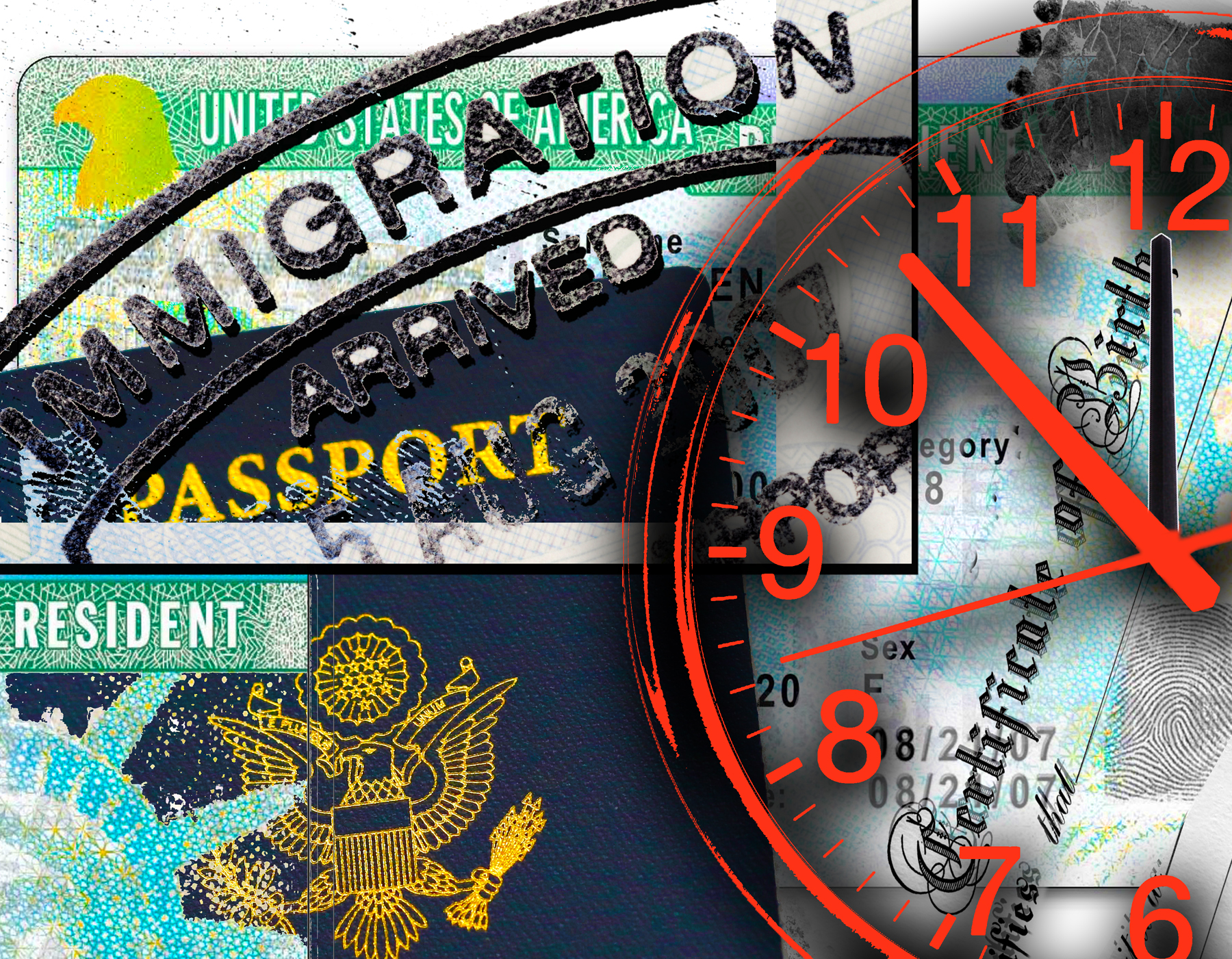
“Do you know you’re an illegal immigrant?”
I was 19 when my social worker asked me this question. Shocked and confused, I said, “What do you mean?” Throughout my life, I had heard about undocumented immigrants from TV and from friends and family. I didn’t realize I was one of them.
“You’re not able to legally work in this country, file taxes, get any financial aid for college, or apply for public housing.”
I was furious. “Why am I just finding this out now?”
That was a year and a half ago, and I had been in foster care for four years. This was not the only bombshell I’d get before aging out of care. I turned 21 as I was writing this story, and my son just turned 7. I need to support him and I need a home for us. I’m scared I won’t be able to do so.
My grandmother is my most responsible relative, though that is not saying much. When I turned 19, my foster care social worker asked my grandmother for my documents to prepare me for aging out. My grandmother told her I had no documents.
I was born in the Dominican Republic and came here when I was 6 years old. I knew I was not born in the United States, but I assumed the adults in my life had done the paperwork to make me a legal resident. For the 13 years I’d been in the United States, neither my mother nor grandmother bothered to get my immigration status resolved.
My social worker was also upset, asking why my grandmother would wait so long to tell her I had no documents. My grandmother said she thought that my mother had told my foster care workers that I was illegal.
How This Happened
One of the reasons I didn’t know I was undocumented is that I had a Social Security number and card, which I had successfully used to get two different retail jobs.
My brother and I had each received a temporary Social Security number and card when we first arrived in the U.S., when I was 6 and he was 4. My mother applied for our papers, but she did not keep up with the process. (She married someone soon after she got here, so she didn’t have to worry about her own status.) She stopped answering her mail, so our application was dismissed and our Social Security numbers were no longer valid. Yet nobody told me that.
My brother was able to obtain his green card and Social Security number because he did not have a criminal record. But I had been locked up for a fight and had to get paperwork from court saying that any case I had was dismissed.
The social worker let me know that I was right to worry. She said, “You don’t have much time. Everything has to be done fast. We have to submit an application for your green card, which is not easy.” She continued, “You have to meet with an immigration lawyer, we have to get your birth certificate, your son’s birth certificate, your passport, proof of address, proof that you’re in foster care, and your GED certificate. Also, we have to go to court and get a letter from a judge, then submit it with the application and get a TB shot and check-up from an immigration doctor.”
I was overwhelmed. This sounded like so much work and the clock was ticking.
Scary Future
I’ve heard people who have aged out of care complain that the foster care system did nothing for them. Once you’re 21, you’re on your own. I got an exception to policy from ACS to stay in my foster home for an extra six months, so I wouldn’t be on the street on my 21st birthday. But after that, my son and I don’t have a place to live and I can’t legally work to support us.
If I work without having the proper documentation, I could get deported or lose my chances of getting my green card. I can’t apply for housing because I’m not a legal resident. I have a better chance at getting an apartment in public housing if I am applying through foster care, but that ends at age 21. It all seemed so scary. I felt hopeless.
[Related: Represent: A Magazine for Foster Kids by Foster Kids]
I had no time to spare. My foster care lawyers got in contact with the immigration lawyer to explain my case and start the process. The immigration lawyer was honest with me. She said we had to submit the application for a green card before I was 21. For a foster child, it usually takes about six months to get a temporary Social and green card, which was all I needed to work and apply for housing. If you’re applying as an adult, it can take a year or more depending on your case.
College Dreams Crushed
I got the new NYC ID for people who don’t have their papers and can’t get a state ID.
I also met with the educational worker in my agency. I told her, “Tell me the truth about my education situation.” She said that if I didn’t have the documents to apply for the ETV (Education and Training Voucher) and financial aid before I turned 21, I would not qualify.
That was difficult to hear because college is expensive. I had worked so hard to get my GED. I knew that to get a high-paying career, I needed to go to college. The fact that I have a son makes it even more important: I need a good income to provide for the two of us. The last thing I wanted was to take out loans and be in debt.
I got my flu shot, TB shot, and an HIV test. I tested negative, and I took all the medical records to the immigration lawyer the next day.
My immigration lawyer submitted my application. I got my interview with immigration only three months after I applied, which my immigration lawyer said was quick. The immigration lawyer asked me if I’d been fingerprinted yet.
I was confused. I said, “No, what do you mean?”
She said, “Well, they were supposed to schedule you to go for your fingerprints, and then make the appointment for the interview.” I’d been told to be fingerprinted after I talked to immigration.
At this point, I was less than a month away from my 21st birthday, so this was terrible news. We went to the interview anyway to see if they would see me, then schedule me for the fingerprints. They told me I couldn’t do the interview until I got the fingerprints done.
I also just learned that when you submit your public housing application, you have to present three or four pay stubs. That is how they determine how much rent you’ll pay.
But, without the green card, I can’t work! Sometimes it feels like they’re trying to make it hard for me, no matter how much I follow the rules. If the agency had started planning at least three years ago, we could have started the immigration process then. I would have had my documents so that I could have applied for housing when I was 18 or 19. Yet here I was turning 21 in a week with no job, no apartment to live in, unable to go to school, and waiting on my green card and Social Security card.
No Health Insurance Either!
Unbelievably, as I was writing this story, it got worse. The week of my 21st birthday, my social worker told me that the Medicaid provided to me by ACS would no longer cover my son or me. Under Obamacare, Medicaid is available to foster youth who age out up through age 26, but you have to re-apply; you don’t automatically stay covered. I would have to re-apply for Medicaid on my own, and in the meantime, I have no health insurance. I have braces that cost a couple thousand dollars. Recently, I had an orthodontist appointment and they told me they could not see me since my Medicaid was not active.
Even scarier, my son has no health insurance. If I have to take him to the doctor, I can’t pay for any visits or medications he might need.
It’s overwhelming. I thought when my social worker said I would get an exception to policy (allowing me to stay in foster care another six months) that everything would continue as normal. Yet the only thing that stayed the same is my foster mother getting checks for me and my son.
Prepare Teens in Care
If I had known all of this earlier, I would have been on top of it. I could have applied for housing and food stamps. I could have applied for Medicaid for my son and me before the Medicaid that ACS provided was deactivated.
Now here I am trying to solve it all, but so much is happening all at once. It is as if I have my own cloud above my head pouring rain on me. No matter what I do I feel like I can’t get out from under it. I’m trying to take it all in, stay positive, and do everything I need to do, but I’m scared I could break down and shut down.
When kids in care turn 16, they should be told to start planning for the aging-out process. What documents do they need? What paperwork needs to be filled out? What are the deadlines and how long will the process take? If you were born outside the U.S., do not assume you are legal, even if you have held a job. Everyone who is in foster care should be made aware of these important things.
Turning 21 shouldn’t be so stressful and scary. I’m realistic about foster care. I’ve known I can’t do what other people can: take their time and live with their parents until they are stable. If I’d known what I had to do to become a U.S. citizen, I’d have done it.
The author wrote this story as a teenager participating at Youth Communication, a New York City-based nonprofit that helps educators engage struggling youth and build their social, emotional and literacy skills. This column was created for Represent, Youth Communication’s magazine written by and for youth in foster care.
More related articles:
Beating the Odds: Boosting School Success Rates for Students in Foster Care
Better Collaboration Key to Helping Crossover Youth, Panelists Say
Teen Birth Rate Drops Dramatically, Still Huge Issue for Foster Kids
































